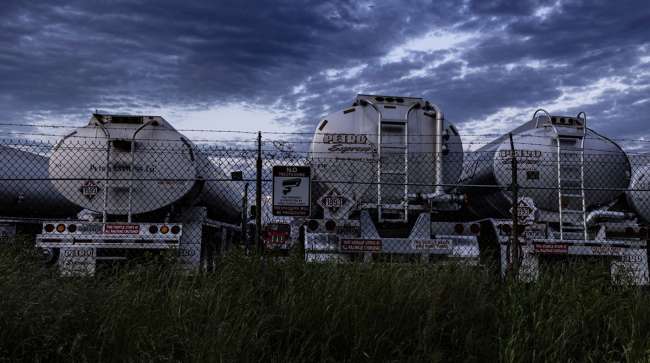Staff Reporter
DOT Issues Further Allowances for Haulers in States Affected by Colonial Pipeline Attack

[Stay on top of transportation news: Get TTNews in your inbox.]
Government agencies at the federal and state levels have taken measures — including steps to facilitate truck movement — as a response to the cyberattack on the Colonial Pipeline.
The U.S. Department of Transportation on May 11 announced additional steps to help states that have been impacted by the incident.
The network, which spans more than 5,500 miles from Texas to New Jersey, halted operations due to a ransomware attack that has been linked to a criminal gang.
In its announcement, DOT determined that states covered by presidential disaster declarations that have been issued within the past 120 days may use interstate highways to transport overweight loads of gasoline and other fuels.
The Biden-Harris Administration is continually assessing the impact of the ongoing Colonial Pipeline incident on fuel supplies. Learn about what DOT is doing to mitigate any potential impacts.https://t.co/uxQeltR1At — TransportationGov (@USDOT) May 11, 2021
“Each state must continue to follow its own procedures for issuance of special permits authorizing the loads, but the added flexibility announced today lawfully permits these trucks to run on the interstate highway system and other federal highways,” DOT’s announcement states.
According to DOT, the previous presidential declarations created this authority for up to 120 days and, because they were issued at various dates, they will expire at different times. Maryland’s 120-day period will expire June 4, while Virginia’s period will expire Sept. 7. The 10 states covered are Alabama, Georgia, Kentucky, Louisiana, Maryland, Mississippi, New Jersey, North Carolina, Tennessee and Virginia.
This announcement follows a previous emergency declaration issued by the Federal Motor Carrier Safety Administration on May 9, which provided relief from hours-of-service regulations to truckers assisting in operations related to petroleum supply chains along the East Coast.
Latest update on the Colonial Pipeline System Disruption: https://t.co/kpWNw0UQve pic.twitter.com/hXSwHXcnDh — Colonial Pipeline (@Colpipe) May 11, 2021
The declaration related to HOS relief applies to Alabama, Arkansas, Washington, D.C., Delaware, Florida, Georgia, Kentucky, Louisiana, Maryland, Mississippi, New Jersey, New York, North Carolina, Pennsylvania, South Carolina, Tennessee, Texas, Virginia and West Virginia.
Agencies within DOT have been active in their response. The Federal Railroad Administration has launched an emergency effort to assess rail operators’ capacity to transport fuel from coastal ports to inland communities.
PHMSA issued a temporary stay of enforcement for pipeline operator qualification rules to allow for use of emergency personnel to help restore Colonial Pipeline service.
More on this & the all-of-government effort to address the Colonial Pipeline incident: https://t.co/jPyzpLlc9K — PHMSA (@PHMSA_DOT) May 12, 2021
The Pipeline and Hazardous Materials Safety Administration has temporarily relaxed enforcement related to pipeline operator qualification rules for emergency personnel who may be needed to help in the system’s partial manual return to service. This enforcement announcement only applies to areas where Colonial Pipeline lacks appropriate resources as a result of the attack.
The Biden administration has launched a multiagency response effort. The group includes DOT, the Cybersecurity and Infrastructure Security Agency, the Federal Energy Regulatory Commission, the Environmental Protection Agency, and the departments of Justice, Homeland Security, Treasury, Energy and Defense. The group has met regularly to assess the attack’s impacts of fuel supply and energy markets.
State officials have also been responsive to the incident. Florida Gov. Ron DeSantis signed a state of emergency May 11 saying the Florida Department of Transportation may waive size and weight restrictions for divisible loads on vehicles supporting emergency relief efforts. Georgia Gov. Brian Kemp signed a state of emergency suspending Georgia’s fuel taxes, allowing fuel haulers to bypass weigh stations and prohibiting price gouging on fuel.

The year is 2039. Zero-emission, electric heavy-duty trucks roll past you on the highway. Charging ports are now commonplace at terminals and truck stops. Diesel-powered vehicles are becoming a thing of the past. You sit and wonder: How did we get here? Here, in 2021, Daimler Trucks North America's head of eMobility speaks to RoadSigns. Hear a snippet above, and get the full program by going to RoadSigns.TTNews.com.
Kentucky Transportation Cabinet Secretary Jim Gray signed an official order May 12 temporarily suspending certain restrictions on motor carriers engaged in transporting petroleum products and ethanol to states affected by the system interruptions. Carriers must comply with safety requirements and keep a copy of the order in the truck cab if ordering under its authority.
“Many states are working in concert to minimize the disruption of fuel supplies,” Gray said. “Our cabinet is doing its part to help ensure that needed relief gets to the affected areas.”
Virginia Gov. Ralph Northam also signed an executive order to let state agencies issue waivers in order to marshal public resources. North Carolina Gov. Roy Cooper issued a state of emergency temporarily suspending motor vehicle regulations to ensure adequate fuel supplies throughout the state.
Under Maryland Gov. Larry Hogan’s designation of authority, Maryland Department of Transportation Secretary Greg Slater issued emergency waivers related to weight restrictions and HOS requirements for motor carriers.
“It is important for Marylanders to know that the supply chain is still working — albeit more slowly than usual — and there is no need for panic buying,” Hogan said May 12. “While the operators of the pipeline anticipate that the disruption is likely to be short-term, we continue to prepare for all contingencies as part of our statewide response.”
Freight industry representatives, too, are tracking the situation, according to American Trucking Associations spokesman Sean McNally.
“ATA is aware of some locations being temporarily out of diesel fuel, but we are not hearing reports of it being a widespread issue yet,” McNally said. “We are closely monitoring the situation and are providing information to our members as needed.”
Want more news? Listen to today's daily briefing below or go here for more info:




